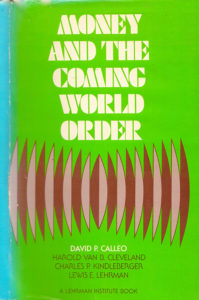In the late spring of 1975, the Lehrman institute, a small private foundation devoted to the analysis of public policy issues, held a seminar entitled “New Modes of Economic Order.” The four essays presented in those sessions have been revised, edited, integrated and collected in this volume. Each of the chapters address the question of the postwar world political economy and its probable evolution. All focus on the monetary system, not only because of its intrinsic importance, but also because the authors fell that it served as a metaphor for the political-economic system in general. Although each chapter goes on to develop a distinct point of view, all four share the perception that both the monetary order and the political-economic order tend to reflect the overall international distribution of power.
Of the four authors, Harold Van Buren Cleveland is the least alarmed by the picture. The monetary system of managed floating, he believes, is a reasonably accurate expression of an untidy world system, whose hegemony, while declining, is still very powerful. Cleveland suggests, moreover, that this untidy system is, in itself, a workable and stable order, likely to persist indefinitely. The others have a more pessimistic view. Charles Kindelberger believes a system is unlikely to function well without a leader. Since he has only tepid hope for any single or collective hegemony to replace a United States afflicted by entropy, his outlook is cautiously pessimistic. Lewis Lehrman and I, if more apocalyptic, are also more optimistic. Unlike Cleveland, I believe the tension between lingering hegemony and uncertain pluralism is unstable and will lead national states, disrupted internally by an increasingly chaotic world system to withdraw into blocs. Ultimately, I hope, the blocs will consolidate and the political and cultural preconditions for a stable plural system will emerge. Lehrman is preoccupied with the problems of how money can again be made to perform its fundamental purpose – to mediate between infinite desires and limited resources. A hegemonial or reserve-currency system leads inevitably, he believes, to inflation which cannot, for reasons he explains, be contained in one country. Ultimately, as Lehrman sees it, a system characterized by increasingly unmanageable levels of public and private debt must collapse – to be replaced, he hopes, by a liberal system of rapid convertibility. In his new system, international discipline will reinforce domestic discipline. Like the eighteenth century, the late twentieth century will move to a new era of restraint and reason.
Edited Work
Money and the Coming World Order
David P. Calleo (Editor), Harold van B. Cleveland, Charles P. Kindelberger, Lewis E. Lehrman, Money and the Coming World Order, A Lehrman Institute Book, New York: New York University Press.
